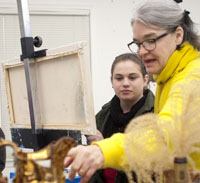Why I Give: Q&A With Lynn Hodge ’68

Lynn Hodge ’68
Q: Tell us a little about your life today.
A: Life today at the retirement community where my partner Barbara and I moved in 2017 has been both easier and more confined than for many during this pandemic. As part of a continuum of care, we’ve really been staying close to home, venturing out only when needed. Services like meals—and now vaccines—brought to us have greatly helped. We’ve read, watched programs, expanded computer skills and exercised regularly. Now we are looking forward to greater freedom of movement to come.
Q: What is your fondest memory from the College?
A: When I recall college memories, my fondest is actually the wonderful 50th reunion the class of ’68 enjoyed. From about 15 participating for our 40th, we grew to almost 95 for our 50th. With that many on campus again, the spirit of friendship that we knew and valued all those years ago and have continued to appreciate was rekindled in new ways. For those of us who worked on the various aspects of planning, it was particularly gratifying to see the enthusiasm translated into monetary support beyond any expectations.
Q: What was your favorite tradition?
A: We sang of sisterhood many times over the four years we shared long ago. We continued that tradition as we sang our own stories together that reunion weekend.
Q: Why do you support the College with a planned gift?
A: I support the College with a planned gift because I consider it one of the institutions that formed me and that has served me well over the years. When I see how we have managed recent difficult transitions and listen to current students describe their lives today, I feel even more convinced that this is a place I want a significant portion of money that remains after me to support.
Q: Why is it important for people to give to Randolph?
A: As I said to classmates as we raised our reunion class gift, supporting the College now and in times to come expresses who we are as alumnae and our appreciation of all the College has meant to us.
Q: What advice would you give to a new graduate?
A: To a new graduate, I say the same as to myself: Take care of yourself, pursue things important to you, and keep eyes up and open to being helpful when and wherever you can.
Show Your Appreciation
Like Lynn, you can make a gift that expresses your gratitude for a Randolph College education. To learn more about gift-giving opportunities that meet your needs and support our future, contact The Planned Giving Office at 434-485-8050 or plannedgiving@randolphcollege.edu.

